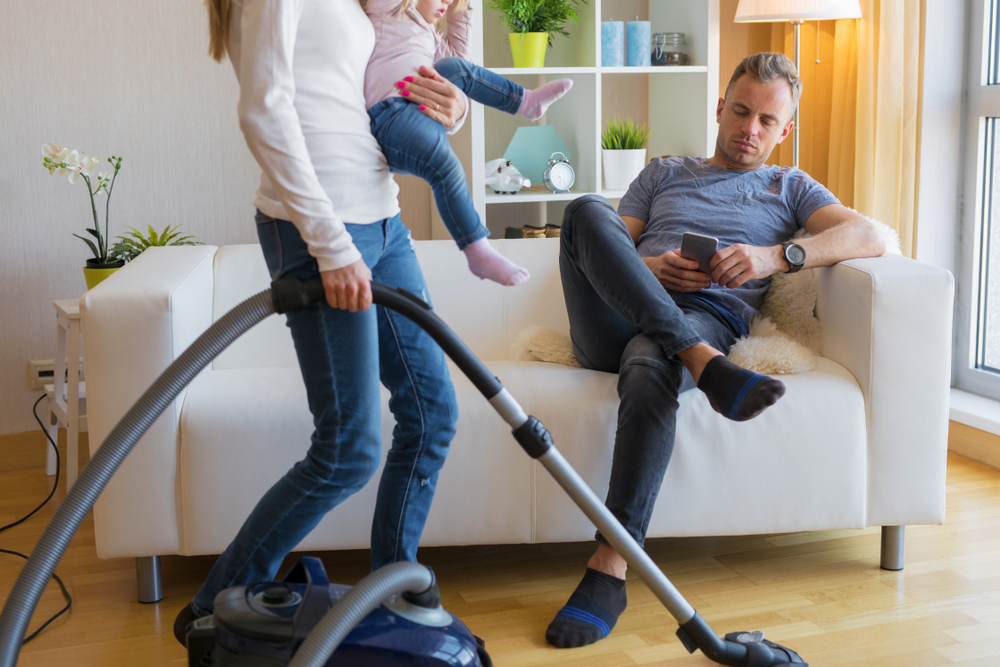
They have recommended that everyone in a household is familiar with the hurricane plans they’ve made. This may include catering for those at work, children’s daycare, and other frequently visited locations such as grocery stores.
Additionally, the government suggests that households should stock adequate supplies. Some recommended items are medications, disinfectants, and pet supplies that are carried in the go-bag or car trunk. Access to these supplies may be limited for days or even weeks after a hurricane.
Households also need to clear drains and gutters, secure outdoor furniture, and consider installing hurricane shutters. It is highly valuable to charge a cell phone and invest in backup charging devices for electronics when a hurricane is forecasted.
2. Stay Informed
In this step, it’s crucial for households to know if they live in an evacuation zone, listed at the end of this article, as they may need to evacuate quickly due to a hurricane. They should familiarize themselves with evacuation routes. They can also practice evacuating with their household and pets, and determine where they will stay.
Households should follow the guidance of local emergency managers, who collaborate with state, local, tribal, and territorial agencies. They will provide up-to-date recommendations based on the specific threats to your community and the necessary safety measures.
3. Check On Your Neighbors
Reach out to your neighbors, especially seniors or those who may require extra assistance, to ensure they have adequate hurricane plans in place. Offer your help in securing their preparations and provide support wherever needed.
4. Stay Out of Flood Water
Households should avoid entering floodwaters, as even six inches of fast-moving water can knock people off their feet. They should prioritize their safety and steer clear of any flooded areas.
5. Turn Around and Do Not Drown
People should be aware that just one foot of moving water can easily sweep away a vehicle. They should stay vigilant and avoid driving through flooded areas. Avoid walking, swimming, or driving through flood waters at all times. When encountering such a scenario, they should turn around.
6. Take Care of Your Mental Health
Lastly, individuals should prioritize their mental health during and after a hurricane. It’s important to acknowledge any feelings of anxiety or stress and seek support if needed. Connect with friends, family, or mental health professionals to discuss your concerns and find coping strategies.
Tampa Mayor Jane Castor has emphasized the need for households to pay attention to the evacuation zones as Hurricane Milton approaches Florida’s west coast. She warned the residents, “I can say without any dramatization whatsoever: If you choose to stay in one of those evacuation areas, you’re gonna die.”
Tampa is located in Hillsborough County. The region has listed compulsory evacuation orders for those in Zones A and B, as well as those who live in mobile homes. Tampa has urged residents of these areas to evacuate as Hurricane Milton is “literally catastrophic.”
Evacuation Zones
Charlotte County: It has issued a mandatory evacuation order for residents in Red Zone-A and Orange Zone-B, including those living in mobile and manufactured homes.
Citrus County: It has given a mandatory evacuation order that began on October 8, 2024, for all residents living in campers, tents, mobile homes, manufactured homes, or any structures unable to withstand sustained winds of up to 110 MPH.
Collier County: A voluntary precautionary evacuation is effective immediately for all residents in Collier County in Zones A and B. This includes west of Airport Pulling Road and south of US-41 Tamiami Trail E.
The order covers mobile home residents and areas with a history of storm flooding. A mandatory evacuation for all of Zones A and B began on October 8, 2024.
DeSoto County: It has issued evacuation orders for Zones A (Red) and B (Orange). These areas affect all residents living in mobile and manufactured homes, as well as those in low-lying or flood-prone areas.
Clay County: Currently, there are no mandatory evacuation orders, but residents in low-lying or flood-prone areas, especially along Black Creek or the St. Johns River, are strongly encouraged to consider relocating for safety.
Hardee County: On October 7, 2024, Hardee County Emergency Management advised residents in low-lying areas, mobile homes, recreational vehicles, and unsafe structures to evacuate as soon as possible.
Glades County: This county has implemented a voluntary evacuation for mobile homes, RV parks, and low-lying areas, which started on October 8, 2024.
Hillsborough County: This county has announced a mandatory evacuation for Evacuation Zones A and B, including all mobile homes and manufactured housing throughout the county, which started on October 7, 2024.
Hernando County: Mandatory evacuation orders for all areas west of US 19, including evacuation zones A, B, and C began on October 8, 2024. This includes all residents in coastal and low-lying areas, as well as those in manufactured homes countywide.
Levy County: A mandatory evacuation is in effect affecting all mobile homes, manufactured homes, recreational vehicle parks, coastal communities, and low-lying areas west of US 19. Hurricane risk shelters have opened at Bronson Elementary for special needs and Bronson Middle High School for general population/pet-friendly evacuations.
Lee County: It has issued mandatory evacuation orders for Zones A and B, urging residents to finalize emergency plans and evacuate as soon as possible. They should aim to be in a safe location by the evening of October 8, 2024.
Manatee County: This county has issued a mandatory evacuation for all residents in Levels A, B, and C, including visitors in RVs or mobile homes, effective October 7, 2024.
Marion County: The Marion County Sheriff’s Office Emergency Management officials have recommended evacuation for residents living in mobile homes, RVs, modular-type homes, and site-built homes constructed before 1994 due to the hurricane’s projected path.
Miami-Dade County: This county has announced a voluntary evacuation center for residents of mobile home parks, opening the E. Darwin Fuchs Pavilion on October 8, 2024, as a pet-friendly evacuation option.
Okeechobee County: A voluntary evacuation has been issued for all low-lying areas and mobile homes starting October 8, 2024.
Pasco County: This county has mandated evacuations for Zone C as the hurricane approaches. Evacuations are required for those in Zones A, B, or C, as well as residents in manufactured homes, RVs, low-lying areas, or structures prone to flooding.
Volusia County: A mandatory evacuation order took effect on October 9, 2024, for all areas east of the Intracoastal Waterway, including residents in manufactured and mobile homes, low-lying and flood-prone areas, as well as campsites and RV parks.
Sumter County: Residents in mobile homes, low-lying areas, or with special needs are strongly urged to consider evacuation or relocating to a shelter when they open.
Sarasota County: Residents in Sarasota County living in Level A or near Level A, as well as those in manufactured home communities or mobile/boat homes, are advised to implement their evacuation plans immediately, whether that involves staying with friends or leaving the area.
Pinellas County: Pinellas County has enacted a mandatory evacuation order for all residents in Zones A, B, and C, as well as all mobile homes. Special needs residents and residential healthcare facilities in these zones are also included in the evacuation order.
Putnam County: A recommended evacuation has been issued for Zones F and A due to concerns regarding high river levels.
Obeying the directives issued by local authorities and noting the evacuation zones ensures that families can evacuate safely and efficiently. This also allows emergency services to respond effectively to those in need.
Women spends 5 hours a day in her kitchen – says it’s her job to make husband’s life easier

Over the past century, millions of women have entered the labor. In the modern society, rigid gender norms are out of date. Husbands and wives divide up responsibilities significantly more equally.
Of course, some women, especially those from his generation, are adamant about upholding gender stereotypes and will stop at nothing to do so.
twenty-five Estee Williams and 23-year-old Connor are married. The way Estee portrayed a “tradwife” infuriated some on the internet. She would prefer to be a traditional wife, sometimes referred to as a housewife, and handle all domestic responsibilities. She happily fulfills her gender role as a wife.

When Estee first met her future husband in 2020, she was a student studying meteorology. The Virginia couple immediately fell in love with one other after realizing they had a lot in common. Her spouse is a full-time electrician. Estee also expressed how much she detests it when he comes home and goes to work. She rarely relies on his assistance.
She helps him with more than just cleaning and cooking. That being said, she lets him organize her schedule, so she doesn’t go to the gym alone. and never buys anything without his permission, not even groceries. She also does her makeup and hair in an attempt to get ready for his return.

The couple does not currently have children, but they expect that everything will remain the same because Estee will take care of the family at home when they do. They also want to have greater control over what their children are “consuming academically” by homeschooling them.
Estee was raised in a broken home and saw her mother suffer after her divorce. The 25-year-old doesn’t believe that women can have it all. And despite the fact that some social media users are quick to call her “lazy” for not contributing financially, she enjoys not having to worry about her job or paying her bills.
Estee is free to choose as an adult what she wants to achieve in life. What are your thoughts on her choices? Leave a comment below to let us know.



Leave a Reply